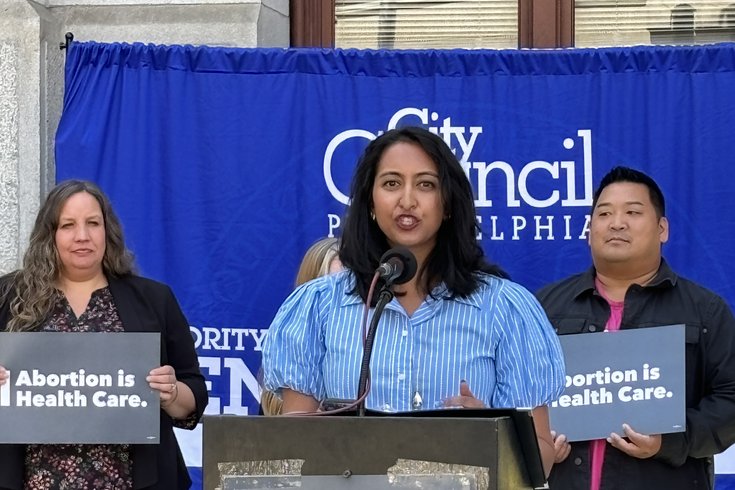
September 05, 2024
 Courtenay Harris Bond/PhillyVoice
Courtenay Harris Bond/PhillyVoice
Dr. Sameera Mokkarala, an OB-GYN and family planning physician soon joining Planned Parenthood Southeastern Pennsylvania, says the $500,000 the city is giving the organization will help provide abortion, reproductive and sexual health care services to uninsured and under-insured people in Philadelphia.
Dr. Sameera Mokkarala, an OB-GYN and family planning physician in Philadelphia, said she sees the challenges women in the city face accessing abortion care every day, despite it being legal in Pennsylvania.
"I think about the mom of three who told me that she was debating between a payday loan and pawning her jewelry to pay for her procedure, or the college student who traveled hours from her campus to get to where she could receive care without stigma or judgment," Mokkarala said.
Mokkarala spoke Thursday at a press conference during which City Council Minority Leader Kendra Brooks announced $500,000 in city funds for Planned Parenthood's Southeastern Pennsylvania chapter. The money will help provide sexual and reproductive services and abortion care to people at its four Philadelphia locations. The chapter's annual spending is about $20 million.
It is the first time the city has given funds to the local Planned Parenthood chapter. The city also has allocated in its 2025 budget $200,000 to address period poverty through organizations that distribute free feminine hygiene products and $250,000 for "abortion liberation funding to help low-income women access health care," as described in a budget line item.
The goal is to ensure Philadelphia remains a place where reproductive rights are protected after the U.S. Supreme Court's 2022 Dobbs v. Jackson Women's Health Organization decision ended the constitutional right to abortion, Brooks said.
Since Dobbs, 22 states have banned or restricted abortion. Abortion is still legal in Pennsylvania, although the state requires a 24-hour waiting period and has other restrictions. New Jersey does not have a wait period or other restrictions, and in 2022 enacted statutory protection for abortion as a fundamental right. Recent New York Times/Siena College polls show that although the economy remains the No. 1 issue for voters, for a growing number of people in swing states, abortion is rising to the top of the list.
During the first City Council session since the summer break, Brooks, a member of Philly's Working Families Party, introduced a resolution that would re-authorize Philadelphia's Reproductive Freedom Task Force, a group of providers, patients and advocates focused on protecting abortion access and reproductive health care autonomy and rights. The task force formed in 2022 when City Council passed a series of bills to strengthen abortion protections.
Those bills sought to prevent workplace discrimination against employees for reproductive health care decisions, including abortion care, fertility assistance and birth control; deter the use of "Texas vigilante" style laws that subject patients, helpers or providers to civil liability for abortion services that are legal in Pennsylvania by permitting Philadelphians to countersue; and bar the disclosure of reproductive health care information when the person doing the disclosure knows or should know that the information will be used for the purposes of abusive litigation or harassment.
Across Delaware, Montgomery, Chester and Philadelphia counties, Planned Parenthood Southeastern Pennsylvania serves approximately 40,000 people a year, including 9,500 for abortion services, said its Chief Executive Officer and President Dayle Steinberg. In Philadelphia, it serves 23,000 people annually, including 6,500 who receive abortion services.
"Although the Philadelphia area is home to several excellent health systems, we face tragic health inequities," Steinberg said. "Black communities, communities of color, low-income communities disproportionately face structural inequities that affect their bodies, their families and their wellbeing."
The new city funding will help provide reproductive and sexual health care services, especially for people who are uninsured or under-insured, in Philadelphia, Steinberg said.
Even though "Planned Parenthood is often a care location of last resort for people who don't have insurance or who can't afford care elsewhere or who are undocumented … you wouldn't know that it's a safety net" because of the high quality of care it provides, said Mokkarala, who until recently worked for Penn Medicine and who is joining Planned Parenthood Southeastern Pennsylvania.
"These are dedicated, loving teams who know that patients know themselves and their needs best," Mokkarala said, "Nurses who hold patients' hands, clinic managers who help people manage finances, physicians and providers who double and triple book their schedules to make sure the job gets done without delay."